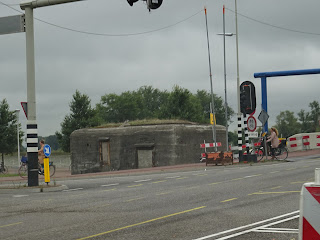Our trip has brought us back to Holland in the area of some major WW2 battlegrounds - Operation Market-Garden, the airborne and land operation to stab through the German defences to Germany, and Operation Verity, the clearance of the west bank after the former Op failed. We didn't aim for it, but it's hard to avoid battlefields in Europe anyway. Market-Garden was the subject of The book and film A Bridge Too Far.
Our route to Groesbeek was via Nijmegan, which the US 82nd Airborne had been tasked to capture. We had quite a fright at one point when an impatient German tried to pass a line of traffic merging after an intersection. He just missed the kerb where the road narrowed: had he hit it he would have flipped over for certain at the speed he was going. This was the second piece of bad German driving as yesterday we had an idiot cut in from the next lane so close he nearly touched us. Again, at his speed the consequences would have been dire. Fortunately, these were the worst incidents we'd encountered in 3 1/2 months.
A Dutch bunker at the northern end of the bridge
And this is the infamous Nijmegan bridge. Currently under repair as it is 80 years old and has been blown up once (by the Dutch in 1940). Ironically the Germans raised and repaired it then failed to blow it in 1944, perhaps feeling they had invested too much time and effort into it already.
We visited the Groesbeek museum. It was so new they were still moving furniture from the old one. I didn't learn much I didn't know already, and given that wasn't a huge amount it was a little disappointing. There were a couple of good displays though.
The US 82nd Airborne Division ahd two landing zones - here around Groesbeek and a second near Grave. You can see them marked in this multi-media display. Groesbeek was important as it had the highest ground in all Gelderland. After Op M-G the Groesbeek heights were the front line and were the kick off point for Op Verity.
This view from the museum shows the type of countryside the airborne landed in.
A few more artifacts of war
We discovered that we had stumbled into the 75th anniversary of the battles. This wasn't planned, but was another serendipitous moment on the trip.
There are a number of sculptures and memorials around the battlefield. This marked the landing zone near Grave.
We were taking the Liberation Route in reverse, crossing the Maas-Waal Canal at Heumen which was the only bridge across the canal captured intact in 1944. The Grave bridge across the Maas (Meuse) was also captured intact
The Grave bridge
Another memorial to the 82nd Airborne (with a bunker behind)
The reenactors were there in numbers
The Maas bridge from the south.
To summarise the thinking behind Op Market-Garden, The Allies had stalled after pushing the Germans out of France as supply had to come from the beachheads a couple hundred miles behind them. Montgomery suggested a swift dagger thrust into the heart of Germany could bypass the German Siegfried Line defences and allow the Allies to pour into Germany. There were three major rivers in the way so airborne troops would capture bridges over them and hold them until the land forces could arrive. The US 101st Airborne would land near Eindhoven and hold a number of smaller bridges in that area. The 82nd Airborne would land at Groesbeek and Grave to capture the bridges mentioned above. Finally the British airborne would land at near Arnhem to capture its bridges. The land forces would race up the corridor these efforts had opened, and debouch into Germany. It was felt that there was little German strength in the area, and that they would pull back to Germany when the pressure went on.
Having crossed the Maas backwards ourselves we camped on the south side of the river.












No comments:
Post a Comment